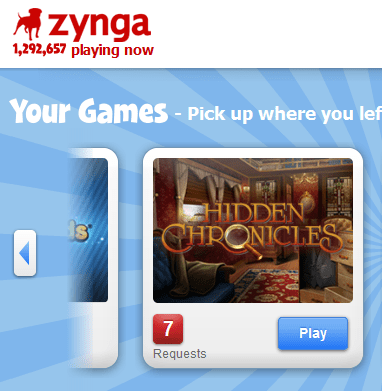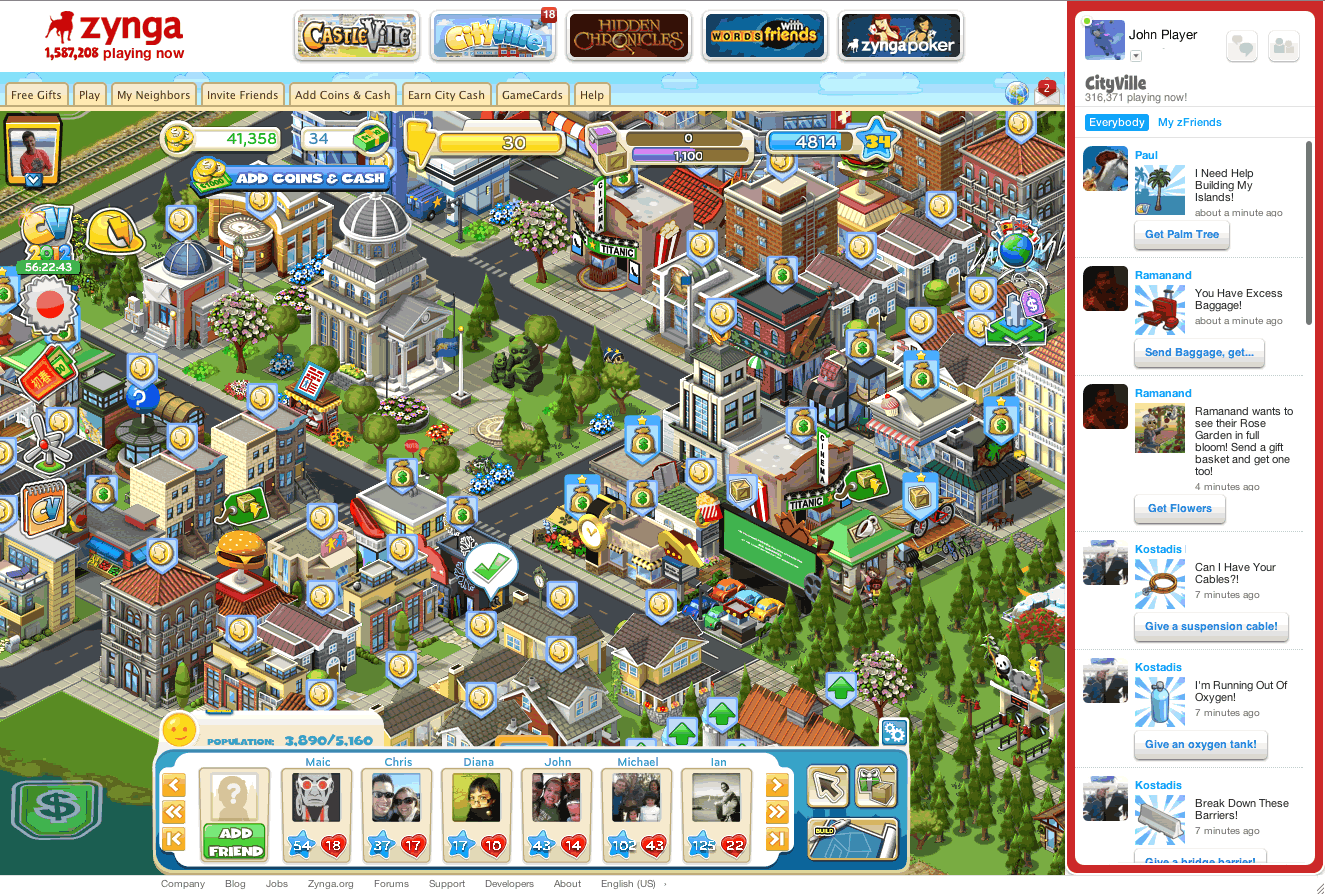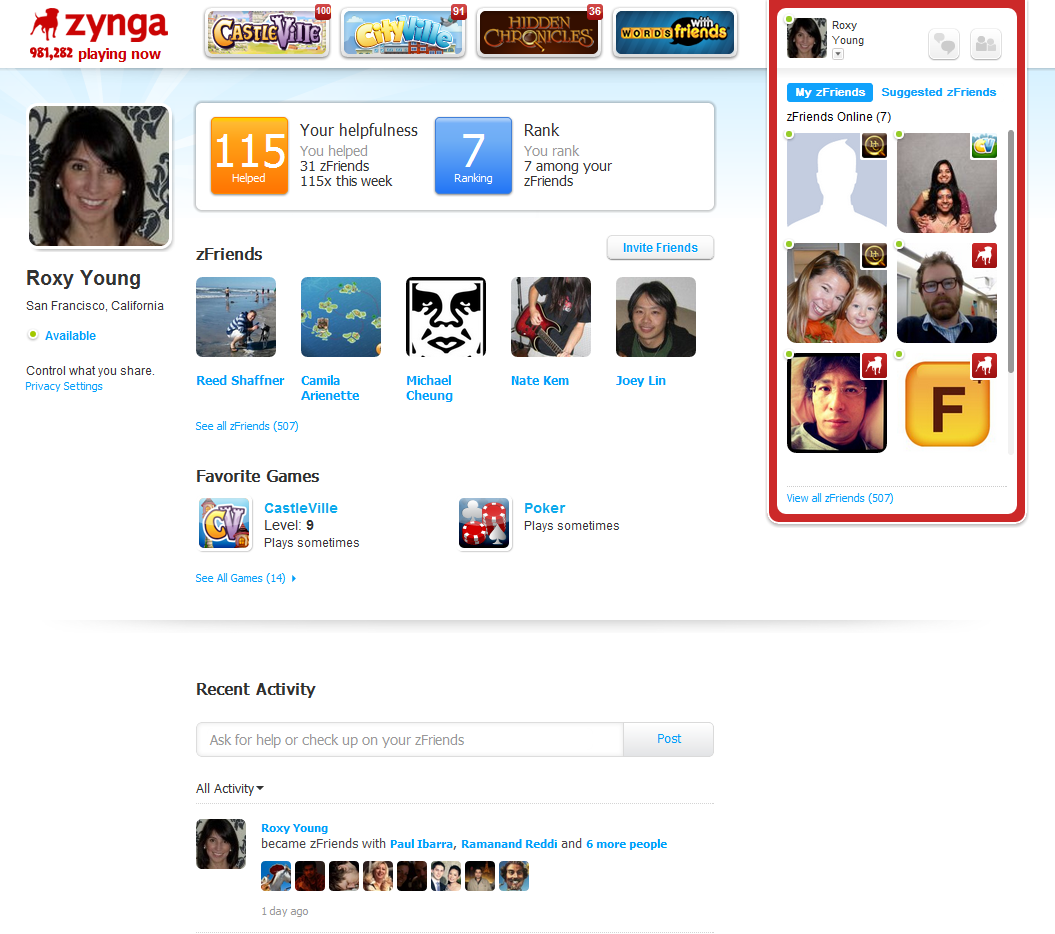Is Zynga going to leave Facebook to start its own site for gamers? Whispers about such an attempt have circulated for years, and today we have an answer: yes and no. Yes, Zynga is starting its own site for games. But no, it’s not leaving Facebook.
At least not for the foreseeable future. Instead, it’s launching a new platform designed to house both its own games and ones from other developers. And, you log in with your Facebook identity, and you pay using Facebook Credits.
The site, available at Zynga.com, is a social gamer’s dream. The types of social channels that Zynga has been testing and refining are all in place. And then some. Instead of just pulling in your Facebook friends, it includes ways to become friends with other people on the site who you’re not connected to on Facebook. People who you want to play with, anyway, that it calls zFriends.
All of your gaming friends appear in the social channels. The social stream shows all of the activity of your friends on these games. User profiles expand on Facebook ones to let people see which games you play, how you rank on various leaderboards, your recent activity and other standard features tailored for games. Live chat lets you talk to other players.
And, more subtly, Zynga sorts through all of your activity on your games and figures out the most meaningful ones to share back to Facebook.
The first five games launching on the site are its biggest and newest hits from social and mobile: CastleVille, Words With Friends, CityVille, Hidden Chronicles and Zynga Poker. Progress comes with you. It’s not just Zynga games, though. It will soon begin adding games from other developers, starting with titles from Mob Science, Row Sham Bow and Ca Va. These games will appear exactly the same as Zynga’s.
Which leads to an obvious question for any social game developer. What’s the revenue split? Facebook is already taking a 30 percent cut via Credits. I asked chief operating officer John Schappert about terms with the third party developers (or is that fourth parties?), and he only said that they’re negotiated and private. So, what you’re looking at is a publishing model where Zynga gets an additional cut. That might make some developers think twice about bringing their games on, but Zynga has some carrots to lure them in anyway.
One is simply its size. The company now has 56.6 million daily active users and 246.9 million monthly active users, according to AppData, and it can push them all toward this site. And with all of these users on the site, other parties could have a much better shot at breaking through to them. Right now, developers have to try to cut through the photos, videos, links and other information on Facebook.
Zynga goes further to make the user-developer relationship meaningful, by pairing the right users with each other. It looks at data about each user, like what types of games they play — FarmVille or Words With Friends or what have you — and suggest that they become zFriends. What the company has discovered, chief technology officer Cadir Lee tells me, is that users don’t really care about the total size of a game. They just want to find the right people to play with. He says that based on the data they’ve compiled over the years of building their own games, the more people any one user is connected to, the more likely they are to engage more.
“You get some impact from one-way interaction, but much much higher with reciprocal actions. You establish a pattern of interacting.” Citing FarmVille, he notes that “if I came to your farm and fertilized your crops, you’re more likely to come and fertilize mine.” For some reason, he says, six seems to be a particularly golden number of connections — more people than that and you’re still getting engagement increases, but just not as much.
The basic idea of this site is not surprising. But the Facebook integration and the inclusion of third parties makes this unique. Going forward, there are two big things to think about. Mobile — Zynga could push its own network to mobile devices and create something far better than, say, Apple’s Game Center. The other, of course, is about Facebook. Zynga is locked into exclusively using it as the core identity and payment service, because of a deal that Facebook forced Zynga to sign years ago. But that won’t last forever. Zynga could one day introduce identity services from any number of other platforms, like Twitter, Google+, and anything else. This launch, then, could be a step in that direction.


